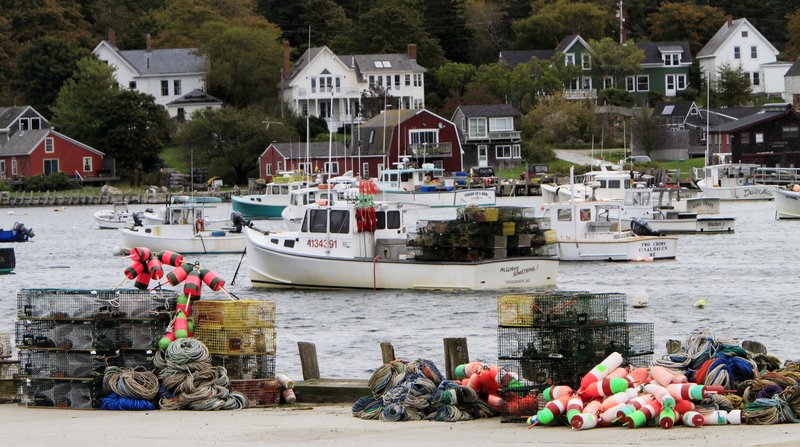AUGUSTA – A Maine seaside dock without a pile of lobster traps is like chowder without clams. But as down-home as a Down East scene can be, the state wanted to kick the traps off one lobsterman’s dock.
Now a bill’s working its way through the Legislature to make sure such iconic images will no longer get the regulatory heave-ho.
“Part of Maine is fishermen throwing lobster traps on docks,” said Rep. James Parker, who’s been lobstering since he was 12. “That’s what people come to see.”
Parker, R-Veazie, has joined other members of the Environment and Natural Resources Committee who voted unanimously in favor of L.D. 49, a bill that bars state agencies from prohibiting or regulating the storage of lobster traps on docks. They even strengthened it by saying related gear, such as ropes and floats, can’t be banished either.
Unanimous committee support means the bill is likely to pass when it comes up for House and Senate votes. And the mood in the State House is decidedly friendly toward such legislation this year, as a newly elected Republican legislative majority and governor, Paul LePage, draw a bead on excessive, redundant and costly regulations.
To some, outlawing lobster traps on Maine piers was just dopey and as far from long-standing practice as you can get.
“The bottom line is, this should never have happened,” Patrice McCarron, executive director of the Maine Lobstermen’s Association, told the committee before last Tuesday’s vote. McCarron said it’s “difficult to understand a recent case in which two state agencies undermined a local lobsterman’s ability to store lobster traps on his dock.”
The story began about five years ago when David Rice, a lobsterman in the fishing town of South Bristol, went to the state Department of Environmental Protection to get a permit for a dock along Clark’s Cove on the Damariscotta River.
The request seemed straightforward enough until the state Department of Marine Resources got involved, and said shade cast over the water from the lobster traps would harm aquatic life, such as seaweed. So the DEP issued a permit, with the condition that the dock couldn’t hold lobster traps — the whole purpose of the structure in the first place. To some, it was like getting a permit to build a garage with the condition that you can’t park your car in it.
Rice appealed, leading to a four-year battle that was finally refereed by the state Board of Environmental Protection. The board, reasoning that the shadow cast by the traps shifts as the sun changes position, said Rice could go ahead and stack lobster traps on his dock.
The Department of Marine Resources acknowledged to the BEP it was mistaken about the traps’ impact on marine life.
Still, Rice went to his local legislator, Rep. Jonathan McKane, to make sure the same thing doesn’t happen again. McKane, R-Newcastle, said the bureaucratic tie-up came at a bad time for lobstermen trying to make a living as costs are increasing while lobster prices are not.
Chester Rice, brother of the lobsterman and a longtime selectman in South Bristol, said something else was in play before the traps were banned. Neighboring landowners he declined to name had complained that the traps would spoil their view of the water.
Dirk Brunner of South Bristol, the only one to speak against the bill that allows the traps, said the view wasn’t an issue to him because he can barely see the dock from his property. Brunner said he was concerned about the shade’s impact on marine life that’s especially sensitive to light, such as eelgrass, rockweed and kelp.
A letter to the DEP from neighbors John Rounds and Athar Pavis-Rounds, obtained by The Associated Press with a Freedom of Access request, says shading would harm rockweed and macroalgae in the cove, and that there’s sufficient room along the shore for Rice to store his traps.
But the letter also cited a “painful reality” of “scenic and recreational” impacts of the traps, and added, “The addition of a wall of traps of top of that pier for six months of the year would amplify enormously this destructive aspect and intrusive nature of this pier.”
With a new government sniffing out and targeting excessive state regulation, the DEP submitted testimony earlier this month in favor of the bill, saying it “recognizes that trap storage in association with lobster fishing is common use on many wharves throughout Maine’s coastal communities.”
Send questions/comments to the editors.



Success. Please wait for the page to reload. If the page does not reload within 5 seconds, please refresh the page.
Enter your email and password to access comments.
Hi, to comment on stories you must . This profile is in addition to your subscription and website login.
Already have a commenting profile? .
Invalid username/password.
Please check your email to confirm and complete your registration.
Only subscribers are eligible to post comments. Please subscribe or login first for digital access. Here’s why.
Use the form below to reset your password. When you've submitted your account email, we will send an email with a reset code.